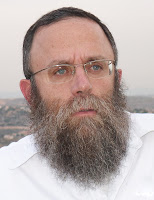 by Rav Yona Goodman
by Rav Yona GoodmanDirector, Institute for Contemporary Education and Religion, Orot College of Education
At first glace, education is a topic (only) for educators, and has absolutely nothing to do with the financial crisis. On second thought, however, everyone needs to engage in education: of our children, but primarily of ourselves. Educational insights can be learned from everything, even the stock market.
Part of the economic crisis stems from a culture that encourages one to develop a lifestyle beyond his means. A lifestyle that is (too) expensive can be built using several tools, including loans and mortgages. Sometimes, people can be seduced into purchasing something expensive under a payment plan that they have no chance of keeping up with. Others are not satisfied with stable investment in the stock market, and instead look for get-rich-quick schemes. However, things that can lead to fast wealth are also liable to lead to bankruptcy. We are now witnessing the cumulative effects of such a lifestyle.
The need for everyone to choose his own lifestyle also arises in the story of Abraham that we are reading about in the last weeks. Two went to Egypt: Avraham and Lot. They returned together as well, having reached opposite conclusions from their exposure to the land of plenty on the banks of the Nile. Avrhaham renewed his commitment to spreading the Name of God, and immediately returned to the place he had been to continue spreading light (Bereishit 13:3-4). Lot, on the other hand, was blinded by the bounty and chose to replace Avraham with the place that most reminded him of Egypt: the Jordan plains (Ibid. 13:10). When we read the parsha, we must decide whose heirs we are: Lot’s or Avraham’s. Make no mistake – Avraham also had wealth (13:2). There is nothing wrong with that. However, his central focus was on the world of the spirit, whereas property remained a means for advancing his values.
In sum, the global crisis stems from the abandonment of basic life values such as work and simplicity, and from a predilection for getting rich fast. Such a reality must inspire all of us to examine our own hierarchy of values, including the place that money and property should occupy in the lifestyle that we strive to implement, with God’s help. This examination is demanded not only so that we do not suffer another crash in the future, but primarily so that we live ethical lives, by God’s light.

